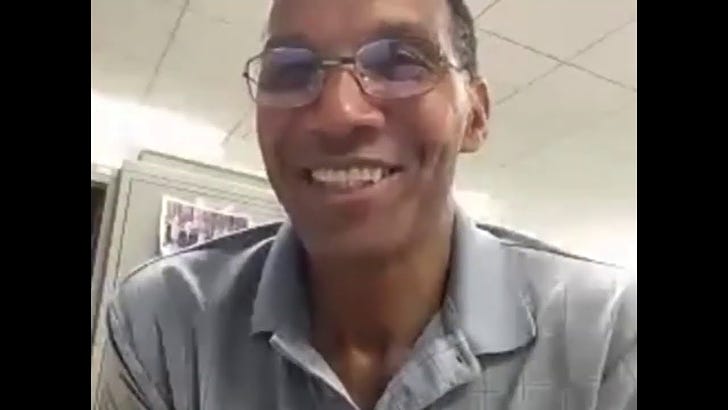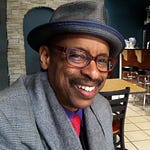vol. 2 issue 41
Greetings,
This past Tuesday marked the 401st anniversary of the arrival of the first enslaved Africans in the ship called The White Lion at Point Comfort, now Ft. Monroe, off the Virginia coast.
Today is the 57th anniversary of the Rev. Dr. Martin Luther King’s I Have a Dream Speech, part of the peaceful March on Washington. It’s also the 65th anniversary of the disappearance in Mississippi of black teenager Emmett Till, found dead three days later, having been not just murdered, but gruesomely tortured and disfigured by two vigilante white men who believed the lies of a white woman who’d said the 14-year-old had made advances on her. She eventually admitted she’d lied. The woman paid no price but perhaps with her own conscience. The murderers went free.
Also 156 years ago today, the Union was debating what to do with the swelling ranks of black men and women who were fleeing to the protection of Union forces to become contraband of war, in hopes it would lead to their freedom.
Ultimately, on January 1, 1863, President Lincoln signed the Emancipation Proclamation which did not free slaves so much as encourage them to flee the clutches of their “owners” and seek protection from the Union Army that desperately needed ranks to continue fighting the rebellious South.
It wasn’t until December 1865, after the Civil War had ended, and the 13th Amendment was ratified, that slaves were actually, legally freed in the US.
The adoption of that amendment began with the actions of three enslaved Africans who did not want to be sent away from their families by their “masters” to build fortifications against Union troops. Instead, they escaped to Ft. Monroe near Hampton, Virginia, and asked protection from Union Major General Benjamin Butler, who cannily sensed an opportunity to punish the South, but which ultimately rewarded all enslaved Africans.
The names of the three men who sparked that fire: James Townsend, Shepard Mallory, and Frank Baker.
Why are blacks ‘invisible’ in America?
When my son was younger, he worked a series of manual labor and service jobs. Many of his coworkers were young black men from less affluent communities. My son observed how he was treated by managers and customers compared to the treatment they received.
“Mom, I don’t think whites actually see black people,” he said to me one day. “If they did, they would notice how hard they work, and how much nicer and more attentive they have to be to others so they don’t get their ass kicked. But then they get treated like they’re not even there.”
My son went further. “Considering the bullshit they put up with every day, you’d think there would be more black violence against whites.”
There is a profound truth packed into my then 17-year-old’s impression of how America works. Namely that white America has gone about its business without much consequence for our inability to “see” our fellow citizens with darker skin.
It was in 1952 that black author and social observer Ralph Ellison published his novel, Invisible Man, a fictional account of the very real phenomenon of how a black man making his way through white America post-WWII and before the Civil Rights movement, was largely ignored and disrespected. It won the National Book Award the following year. Yet it was in the last decade that my son, who had not read the book by the way, shared his observation with me, signaling not much has changed for the better.
Black Americans today, with protests in the streets and professional athletes taking a knee or refusing to play altogether, certainly have our attention, even amidst a sizeable portion of the nation being on fire, another being under water, still another huge portion clearing the rubble from powerful windstorms, and all of us under siege thanks to the political war raging, the economy collapsing (Wall Street gains are not the economy), and a plague inundating our hospitals and upending our lives.
But attention is not what black Americans are looking for, according to my guests in this interview. Aside from an end to unjustified murders and harassment of black men by some white authorities, what is actually at issue is empathy. Black Americans want to trust white Americans are with them, that we won’t abandon them in their pain, and especially that we will not make their pain worse than it has to be.
What is their pain? It is the pain of being ignored en masse, of not being remembered in the calculations for who gets access to resources in this country, and of being made to suffer unnecessarily as a result. In particular, it is the pain of being promised something in return for loyalty and sacrifice, only to have the terms change, the promises broken.
That is what is explored in this interview with three officers from the Contraband Historical Society, a Hampton, Virginia-based nonprofit educational group focused on the contributions to American freedom made by the contraband slaves in the US Civil War. My guests are Pamela Holley, a contraband slave descendant and research advisor to the Society; Phillip Adderley, president of the Contraband Historical Society and a board member of the Citizens for Fort Monroe National Park (CFMNP). His efforts helped lead to the proclamation by President Barak Obama that May 24th is now “Contraband Day’. And also, Dr. William Wiggins, a former history professor and assistant dean at Columbia University, who is the Society’s historian. The Society was founded more than 20 years ago by another contraband descendant, the late Gerri Hollins.
Who were the Contrabands?
As detailed in this video, the original contrabands were three slaves who fled for their lives to Ft. Monroe near Hampton, Virginia at the start of the Civil War. When their “owner” demanded their return, the Union general in charge countered that if the men were someone’s “property”, then they could be confiscated, making them contrabands of war.
This became known as the Contraband Decision, and it paved the way for what ultimately became 200,000 enslaved Africans leaving their bondage and joining the Union’s fight against the South, attending to the needs of the white soldiers, as well as fighting alongside of them in hopes of being made truly free.
Why should we care?
The contraband slaves’ story is important because it contains the key to how the Civil War went from being a fight over economics and keeping the nation intact to being centrally about emancipation and freedom. These Africans’ bravery and loyalty forced the Union to consider the unvarnished question, “What do we do with all the black people?”
The path to civil rights for blacks in this country eventually might have happened some other way, since, as Dr. King said four days before he was murdered: “The arc of the moral universe is long, but it bends toward justice,” an optimistic view of humanity if ever there was one.
However, it is this view that black Americans largely have held from the beginning of their time on this continent, beginning more than four centuries ago.
Who best exemplifies the American ideal of ‘freedom’?
It was because black men who, despite having been enslaved by some white men, chose to put their trust in still other white men, and believed that through their service they and others like them would be recognized as humans. That they would be free. That other men would treat them justly, would allow them to live in a just universe.
As a result, I can only conclude that the freedom I have considered my birthright as an American woman began resonating not with the Constitution, which was directed at white men even if its spirit was expansive enough to eventually include me, but with the trust and actions of these black human beings who understood the nation’s spirit, perhaps better than any other white man living or dead who’d ever tread foot upon this land.
That is why we need to care about this story. It is not just black people’s history, it’s all of ours as Americans. To bang on about freedom without acknowledging and respecting that it was black men who made sure we focused on its promise, is to fundamentally misapprehend what Land of the Free, Home of the Brave actually means.
‘What would Jesus do’?
When we speak of reparations for the ancestors of the enslaved in this country, many in the white community become angry and defensive. Some of us claim there are not enough resources to retroactively “cover” the price admittedly paid by blacks. Others of us are upset to be placed on the hook for past actions none of us in the present day had any say about. Others claim that since they aren’t racist, they should not be made responsible for racist actions.
These sentiments are collected loosely within the argument that if America were a racist country, we would not have elected a black president, and perhaps might soon elect a black vice president. The argument also contends that there are plenty of prominent black Americans such as Gen. Colin Powell, Sen. Corey Booker, former Secretary of State Condoleeza Rice, or former National Security Advisor Susan Rice (no relation), so it’s impossible to claim racism is a barrier to equality in America.
Although a plausible defense, it’s a naïve one, one that ultimately deflects taking responsibility for the nation’s original sins of genocide of the indigenous Americans and enslavement of Africans, two sins of our fathers that are so irrefutable, no one dare seriously say otherwise, not even MAGAs.
To that end, and especially for the self-proclaimed evangelical Christians who make up just under a third of our total population, I offer an insight that undercuts this position of “not my problem”: If Jesus died for all our sins, and then commanded that to gain entry into heaven, we be like him, then it’s time for us all to clear the spiritual miasma of our nation’s sins by taking responsibility for them, even if we think we had nothing to do with them. That’s my answer to WWJD (“What would Jesus do?”).
Many Evangelicals do think this way, thankfully. Well, some of them. There are those who are going off like rockets because of the also indisputable fact that the Black Lives Matter movement is overt in its opposition to all pillars of our white-built hierarchical structures, and states clearly its alarming intentions such as to disrupt the “Western-prescribed nuclear family structure”.
And yet, are we so critical-thinking impaired that we can’t see the personal and societal benefits of treating black Americans with empathy, regardless of what a political movement — including those enmeshed with the religious ones — also says about it? Just because the BLM organization, Evangelical churches, Republicans or Democrats, or (fill in the blank), has anything at all to say about the intrinsic value of a human life, we somehow need some organization to spin it for us?
How about we forget everything that any of these groups say and just get back to the basics of what all successful societies across time have said in one form or another: do unto others as you’d have them do to you.
That’s not synonymous with letting others think for you. Spiritually mature, thinking adults can whole-heartedly support and embrace that life matters across any and all demographics without having to wait for some group to clarify that moral imperative.
In my case, not being an avowed evangelical anything, I confess that because I had black friends, my initial reaction to my son’s insight was that it didn’t apply to me. But after I thought more about it, I realized that because my friends and I were all roughly equal in our social standing, it just made the existence of racism harder for me to see.
Once sensitized to it, however, I began noticing how I often did ignore black people outside my usual sphere, or how I tended to prefer interacting with whites over blacks in my everyday life. If I had a choice on a train to sit with a white person or a black one, the white person usually “won out”. If I had a choice to be served by a black person instead of a white one…and so on. It wasn’t because I hated anyone, or because I consciously thought of myself as “above” black people, it was because I was acting according to what was familiar to me.
As for our having elected or “allowed” black people to prominence in this nation, why should we think that pointing to these aberrations is proof that the norm they flaunt doesn’t exist?
My black friends might seem to enjoy the same fruits of their labors as other Americans such as myself who have seized whatever opportunities we could. But the fact remains they are more in danger of losing what is theirs than I am simply because they are black. Life is hard for everyone at one time or another, that is true, but white Americans are less likely to be killed or harassed by those in power than are blacks. That is a fact, and saying racism doesn’t exist because “look at all those successful black people” doesn’t change that fact.
Neither does it change the fact that statistically, when we talk of social ills in this country, they predominately center on black communities where material poverty and blight might not be evident, but where education, housing, job access, and nutritional foods are poor. This is also a fact, and it is to do with how our hierarchical, not democratic, system so often explored here in the pages of docu-mental, naturally makes it so.
Who leads us along the ‘arc toward justice’?
In this week of important anniversaries in American history, there is an irony afoot. This week has also been that of the Republican National Convention, replete with so much red, white and blue theatrics so as to become a patriotic burlesque, all aimed at a distinct demographic of Americans who, like so many black Americans, feel certain their needs have not been met.
This group, the MAGAs, have invested their hope in the future in a white man whom they call “the people’s president”, a moniker that was thumped over our heads more than once during the convention festivities, and one that was cheered by these Americans who love their leader because he has flaunted the so-called kingmakers of both our political parties, appealing to their sense that they too have been left behind by someone and now need someone to look out for them, a phenomenon with which I don’t quibble, but unlike the MAGAs, lay fault not at the amorphous “Radical Left” but at the feet of the white men in Congress and on Wall Street who have by various means, stolen MAGAs’ dreams, a phenomenon also explored often in these pages of docu-mental.
In any case, these are the Americans who believe that their chosen leader will not bow to The System, or so it would appear anyway as he tweets and tweets without subjecting his thoughts or unilateral policymaking to a formal vetting process. Take a knee? Never. There is far too much humility in that.
And this is what is so striking: whether it be through protesting in the streets or taking a knee on the field, or even refusing to take to the field, black Americans are choosing through their lawful, humble actions to refuse to play the game of being seen as inferior.
Is there looting and rioting and burning and resisting arrest right now in the black community? Yes. Is it warranted? No, but I understand the rage and opportunism behind it, and I note that it is not being condoned nor committed by the leaders of the black community. Therefore, are whites in danger of being attacked and brutally murdered by black mobs? Nope. Are blacks at a heightened risk of such attacks? Sigh. What do you think?
Black America is putting its faith in our democracy, in our common goodness and decency. They continue to trust that in time, as the moral universe continues its arc, we will do the right thing.
Meanwhile, white MAGAs who feel aggrieved by being seen as less-than by the powers that be have responded by celebrating as their leaders knowingly and repeatedly break the law.
Putting aside all known and debated other violations of the law by this POTUS, every single night of the RNC Convention was knowingly performed in full violation of the Hatch Act which bans political leaders from campaigning on federal property, among other statutes. When asked about it, the acting White House chief of staff said in a stunning moment of candor in a year full of such moments from the pack of law breakers in this administration, “No one cares.”
So, there he was, P45 and his entourage, all week unlawfully using the people’s house indeed, as well as the White House Rose Garden, and even the resources of our State Department to campaign for a return to America’s past, the one that no one, not even MAGAs, will deny is a past predicated on breaking the Mosaic commandments of not coveting, stealing, and killing. A sinful, painful past.
And as we have seen and documented here, that past is in fact The System, the very one that has begun to erode the privileges of every American except those at the very tippy top, and the ones in power whom we allow to flout the law. Which is to say, it is a system that if we continue to support will eventually crush not just black Americans, but all of us.
What is the road to reparations?
Seen this way, to not take responsibility for our nation’s original sins is as costly or more so than if we refuse to atone for the inherent evil within all our institutions, or to refuse to offer reparations for the resulting harms.
But let’s be sure we even know what we mean by that.
My way of making reparations was to change my behavior. It wasn’t hard. I committed to looking black Americans in the eye when I encounter them and to say hello so there is no mistaking that I see them, that I recognize them.
I don’t wave signs, I don’t yell at the police, and I don’t look specifically to support black causes, although each of these actions do have their time and place. I didn’t even have to admit I was wrong, nor feel as though I were taking on the burden for all of white America, even though I do accept that my awareness of the burden is the same as being responsible for it. In any case, all I had to change was my way of seeing.
It is a reparation that costs nothing, but means everything. For this small investment in other Americans, I have been repaid with smiles and warmth. People respond positively to being seen as people. Imagine: if this were the norm, blacks would not be placed in the demeaning position of having to insist, yet again, that they matter.
The road to reparations does not start with calculations but with empathy, with admitting we have a shared history and then bothering to learn from it. The idea of freedom that we cling to in this nation isn’t the one that we wave our flag around the world professing; it’s the one that black Americans have fought to secure right here under our noses and always to everyone’s benefit, definitely mine as a white woman.
Maybe there will be a time for writing checks, but until we listen and hear with our hearts, writing checks will only serve as an attempt to buy off black America in exchange for our continuing not to pay the real debt: remorse and sorrow for our nation’s foundation being set firmly upon abject inhumanity, for our forefathers having broken God’s laws, and for our white privilege arising from those sins, regardless of our either professed or true ignorance of this fact.
This interview is an opportunity for us to consider how freedom for all Americans was secured by the actions of enslaved Africans before, and how it is reinforced by African Americans now. It’s an opportunity to listen without being defensive, and to learn to see the love of freedom for all reflected in the faces of every American.
Links of interest:
Sacred Ground: The Episcopal Church’s response to racism
The National Park Service’s Ft. Monroe and Point Comfort history pages
Thank you to the patron subscribers who helped make this video series possible. With your support, I purchased video editing software, and some other tools to help continue improving the production values of all the docu-mental media. It remains a work in progress, but I am committed to your commitment in me, and grateful to you for it. If you are a regular subscriber who’d like to become a patron subscriber, here’s a link to how you can do so:
Next month, video number 3 is a conversation with IN Series Opera company director, Timothy Nelson, who will discuss what role the arts have in helping society create and perform meaningful rituals that bring us together through catharsis, common stories, and a shared vision of a peaceful future.
Thank you for exploring these topics with me.
Whitney













The Road to Reparations: Learn your history. Consider your part in it. Live accordingly.